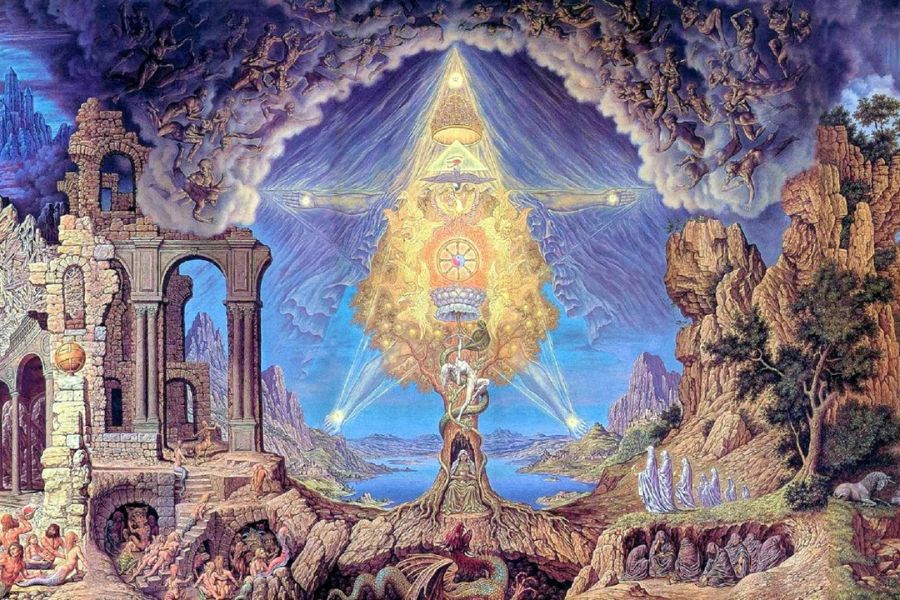Before embarking on the journey of the Fourth Way, it is essential to prepare ourselves properly.
Just as a trip requires preparation and planning, the Fourth Way demands that we carry a baggage of prior knowledge. We must be familiar with common concepts about esotericism, occult knowledge, and the potential for inner evolution of the human being. These topics, although widely discussed, need to be accessible to us so we can approach them effectively.
It is also helpful to have some understanding of science, philosophy, and religion. However, excessive attachment to religious dogmas, without true comprehension of their essence, can be a significant obstacle. If our intellectual baggage is light, and our understanding limited, it will be difficult to grasp and discuss deeper ideas.
The first rule to follow the Fourth Way is disillusionment. First, we must become disillusioned with ourselves, our abilities and efforts, and then with the old beliefs and paths we have followed thus far. We cannot perceive the value of the Fourth Way if we are still convinced that old methods will lead us to somewhere significant.
This disillusionment does not mean that we must abandon our beliefs or disciplines. For example, a scientist does not need to lose interest in science, but must become disillusioned with conventional scientific methods, recognizing their limitations and flaws. The religious person, in turn, should not abandon their faith, but become disillusioned with the visible instructions and methods of religions, feeling the need to search for the hidden and deeper aspect of the teachings. The philosopher must realize that common philosophy is often superficial, but that true philosophy should exist and be sought.
It does not matter what attracted us before or what we followed in the past; true preparation for the Fourth Way only happens when we become disillusioned with the ideas and methods we previously believed would lead us to evolution. If we still believe that our old path can provide something, we are not ready for the journey. However, this does not mean that the Fourth Way requires us to abandon everything we used to do. On the contrary, there is no need to renounce what we are, but we must recognize that many of our actions are just tasks, habits, or needs.
The Fourth Way does not choose us; we choose ourselves, often by chance or due to the spiritual hunger we feel. Those who do not have this hunger cannot be guided by chance, while those with great spiritual need sometimes find the beginning of the path, even in unfavorable circumstances. Furthermore, the person must have acquired certain prior knowledge that allows them to discern the path.
For example, an educated individual with no knowledge of religion may come across a religious path but will not understand its meaning, considering it a superstition. The same happens with someone who has never heard of yoga or practices of consciousness development. For someone to perceive the truth of the Fourth Way, it is necessary that they have already experienced or understood the paths of the fakir, monk, and yogi, or at least have reflected on them and concluded that they are not suitable for themselves.
The Fourth Way is particularly challenging. To recognize and appreciate it correctly, we must have already gone through disillusionment with many other paths and practices. Perhaps we have not practiced the methods of the fakir, monk, or yogi, but at least we must have studied them, understood them, and decided that they are not suitable for our journey. The most important thing is that disillusionment with other approaches is present within us, allowing us to discern the true nature of the Fourth Way.
The Fourth Way requires, above all, that we are willing to sacrifice our self-centered freedom. Everyone, in some way, seeks freedom, but true freedom is an illusion that we need to learn to sacrifice. By realizing that our search for freedom is, in reality, an obstacle, we can begin to conquer true freedom, without fear of losing anything, for we understand that we have nothing to lose. By doing this, we experience a sense of unity and inner will, in addition to acquiring new skills and qualities that were previously impossible.
This transformation does not occur only externally, but also internally, and to achieve it requires strong determination. We must deeply understand that there is no other way to follow, that we cannot do anything alone, but that we still need to act. The greatest mistake would be to begin working on oneself and give up halfway, without achieving any results. Therefore, determination must be tested repeatedly.
When deciding to follow this path, we must clearly define how far we are willing to go and what we are willing to sacrifice. While the easy answer is "everything," it is important to understand that no one can sacrifice everything. The true challenge is to precisely define what we are ready to leave behind, without bargaining or future regrets.
This challenge is illustrated in an Armenian fable, which shows us the difficulty of renouncing our immediate desires. In the fable, a wolf that had destroyed many sheep decides to change its life and no longer eat sheep meat. During a religious service, the wolf, remorseful for its actions, prays fervently. However, when it looks out the window and sees a flock of sheep, it cannot resist and shouts to the priest: "Stop this, priest, or the sheep will disappear, and I'll be without dinner!"
This fable reflects our own condition. We are often willing to sacrifice everything except what we want right now. We begin great changes with high expectations, but this is impossible to achieve immediately. The beginning of the journey must be made with the small things of the present, and it is through them that we find the true path.




















